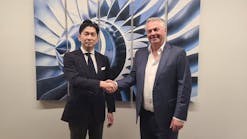Ford International Airport Announces Third Round of FLITE to Support Next-Generation Air Service Technology Solutions
The Gerald R. Ford International Airport Authority, together with Michigan Economic Development Corporation, Seamless Ventures, Southwest Airlines, Stantec GenerationAV and the West Michigan Aviation Academy, has announced the third round of companies that will receive a total of $171,000 in grant funding through the Ford Launchpad for Innovative Technologies and Entrepreneurship, or FLITE.
One of the first airport-based initiatives in the nation, FLITE provides funding to encourage the design, development and pilot testing of new products and services in a live airport environment. FLITE has completed two rounds of funding and will launch a third round in spring 2023. The five companies that will receive grant funding through this next round include:
- Cyberworks Robotics: Retrofitting autonomous navigation technology for OEM products.
- Deaf AI: Training machines with artificial intelligence to use sign language to improve the experience of communicating with those who are deaf or hard of hearing.
- Renu Robotics: Revolutionizing the way aviation facilities conduct vegetation management with autonomous lawnmowers.
- Solartonic: Enhancing security resilience with autonomous smart solar-powered lighting and camera systems with reduced operating costs.
- UV Angel: Using first-of-its-kind software to reduce bacteria, viruses and molds on frequently touched surfaces and in the air.
“After the successful completion of two rounds of funding, FLITE has proven to be a key asset to the Gerald R. Ford International Airport and the state of Michigan’s local entrepreneurial ecosystem,” said Tory Richardson, president and CEO of the Ford International Airport Authority. “It has become a leading platform in transforming the aviation industry through the introduction of new technologies that advance our ability to provide a world-class experience to all passengers and guests.”
A new partnership for FLITE includes the West Michigan Aviation Academy, a tuition-free public charter high school that provides a unique educational opportunity for students to focus on high-growth employment fields in the aviation industry during their high school education.
“The West Michigan Aviation Academy was very excited about the possibility to bring real-world innovation to the classroom with the partnership with FLITE,” said George Pavey, dean of aviation for West Michigan Aviation Academy. “Many of these cutting-edge projects connected with the FLITE program have provided countless opportunities for our students to experience learning beyond the academic setting. To see and experience the future of aviation and engineering further enhances our ability to develop the next generation of industry professionals.”
As Michigan’s lead advocate for business development, job awareness and community development with a focus on growing the local economy, MEDC provided grant funding to FLITE through the Office of Future Mobility and Electrification, or OFME.
"For Michigan, innovation is in our DNA. With the announcement of FLITE's round three of funding, we are positioning the state to be a global leader in high-tech and multi-modal mobility innovation," said Charlie Tyson, technology activation director with OFME. "Programs like FLITE at the Ford International Airport not only support Michigan-based entrepreneurs but also global tech companies as they seek to grow here in Michigan."
Cyberworks Robotics, based in Ontario, Canada, is a provider of specialized autonomous self-driving systems for airport wheelchairs, autonomous industrial carpet cleaners, autonomous floor scrubbers and autonomous tow-tuggers. Specifically designed for airport operations, its technology is designed to operate in crowded large-scale environments to safely mitigate labor shortages and reduce operating costs.
“Being based out of Canada, FLITE provides access to test and grow in the U.S. market,” said Vivek Burhanpurkar, CEO of Cyberworks Robotics. “We’re excited about the opportunity to connect with the FLITE partners and advisory committee as resources for our technology and business development.”
Deaf AI, based in Toronto, Canada, is an artificial intelligence venture that focuses on improving communication for those who use American Sign Language due to hard of hearing or hearing loss. Its technology converts flight and boarding announcements into sign language at airport terminals.
“Throughout my communications with different airport authorities, a few of them referred us to the FLITE program as a starting point after noticing that Deaf AI is an early-stage venture,” said Mehdi Masoumi, founder and CEO of Deaf AI. “The aviation industry has a significant gap in pilot studies and soft landings for innovation, making it difficult for early-stage startups to present their innovations to airport authorities. FLITE singularly built a bridge to address this gap by providing resources for early-stage startups.
“For Deaf AI, FLITE is a window of opportunity to test its innovation and reach out to other airports, including airports on the advisory boards of the FLITE program.”
Renu Robotics, based in San Antonio, Texas was part of FLITE’s second cohort and will be returning for round three to conduct additional pilot testing of their product.
"Round three allows us to further explore the Renubot's mowing capabilities in areas of the airport where larger mowers cannot easily access, as well as a cost-savings comparison," said Tim Matus, CEO of Renu Robotics. "We're also continuing to look into FAA requirements for operating on airport grounds and how those regulations are applicable."
Solartonic, based in Ypsilanti, Michigan, provides off-grid solar-powered smart poles that are safe, resilient and sustainable. Their smart solahub platform integrates cloud-controlled devices with framework products for LED lights, CCTV cameras, Wi-Fi networks, IoT sensors and digital signage through remote monitoring and control.
“We are excited to participate in FLITE with the Ford International Airport,” said Harry Giles, co-founder and CEO of Solartonic. “FLITE provides the ideal opportunity for us to demonstrate the value of our solutions to enhance airport perimeter security, passenger experience and airport operations. In partnership with Jacobsen|Daniels, we intend to apply this to airports across the country.”
UV Angel, based in Grand Haven, Michigan, is a disinfection technology company that uses UV Light technology, advanced optical engineering and a first-of-its-kind digital software platform, to disinfect surfaces by neutralizing bacteria, viruses and molds.
"We look forward to placing our UV Angel Clean Air™ Technology in the Ford International Airport," said Tom Byrne, CEO of UV Angel. "The aviation industry has a critical need to protect personnel and travelers, and the FLITE program will provide invaluable insight and feedback to further our mission to make indoor spaces cleaner, safer and healthier for everyone."
The Ford International Airport has identified six core focus areas for new technology advancements through FLITE:
- Automation and Analytics: Improving operational efficiency and optimization of the workforce and other resources through automation and analysis of data.
- Safety and Security: Strengthening passenger and worker safety and security throughout the airport campus.
- Enhanced Guest Experience: Improving the pre-boarding experience.
- Sustainability: Switching fossil fuel vehicles and infrastructure to electric and other decarbonization projects.
- Door-to-Door Experience: Improving the experience and efficiency of getting to and from the airport.
- Advancing Aviation: Exploring the enabling infrastructure and implications of emerging commercial aviation use cases.
Applications for round four of FLITE are being accepted now through June 30, 2023.

